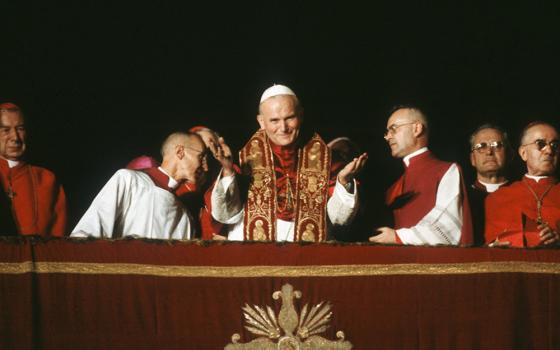
(Dreamstime/Astiphoto13)
The front page tackles big issues of the day for Catholics: how priests deal with birth control in the confessional; Blacks leaving the church; changes in the Mass; and a big meeting at the Vatican.
The date was Oct. 28, 1964.
From the get-go, the weekly National Catholic Reporter (15 cents per copy) tackled tough issues head-on. It is a remarkable start at a time when the church was deep in the midst of change emerging from Vatican II.
We covered and commented on abortion, celibacy for priests, remarriage after divorce, and women's ordination. There are echoes today. As we have been writing, women's role in the church remains contentious, a matter of controversy and discussion at the synod in Rome. And so does sexuality, which bedevils global clerics to this day.
We are happy to introduce a new feature that reminds you of that history from the pages of the National Catholic Reporter. We have launched a series that will feature many historic articles as we celebrate 60 years of independent and fearless journalism.
Our first example, pulled from the archives that are lovingly curated by longtime staffer Toni-Ann Ortiz, is a provocative interview with a Jesuit sociologist who discusses what priests are saying to women in the confessional about taking the birth control pill to prevent conception.
Not long after the publication of that article, and later cutting-edge stories, the local bishop in Kansas City, Missouri, where the National Catholic Reporter was and is headquartered, showed up at NCR board meetings to complain. Bishop Charles Helmsing eventually demanded that the name "Catholic" be removed from the name.
Obviously, that did not happen. And it never will.
Advertisement
Courage is deeply embedded in the DNA of NCR and it is one of the reasons virtually all of us chose to work for this storied publication.
That fearlessness can be seen today in our last editorial before the election, a product of our still-under-development editorial board (which we will talk about more soon, in the weeks to come.) The editorial pulls no punches. It is a frank criticism of the hateful rhetoric from Donald Trump and JD Vance, the latter of whom is the only Catholic among the four major-party nominees.
But we do not endorse a candidate.
So, you might be asking about now, if we are so fearless, why don't we endorse a candidate?
This year, endorsements have become more than an academic question.
The news from The Washington Post and Los Angeles Times that they will not endorse a candidate for president brought an avalanche of criticism.
"This is cowardice, a moment of darkness that will leave democracy as a casualty," former Post editor Marty Baron told NPR. Ouch. Baron is puckishly and quite deliberately puncturing the motto christened on the Post by billionaire owner Jeff Bezos: Democracy Dies in Darkness. (Our moniker is the Independent News Source.)
At the Los Angeles Times, the non-endorsement decision led to resignations.
NCR has challenged popes, cardinals and bishops. Why not take on a presidential endorsement? Because we are a nonprofit newsroom, NCR has never endorsed a candidate for political office.
Why? We must bow to a higher power — the Internal Revenue Service.
I asked Professor Darryll Jones at Florida A&M University College of Law to explain. He said, "501(c)(3) absolutely precludes a (c)(3) exempt newspaper from making endorsements."
Let's break that down. First, the word nonprofit is imprecise; I prefer public charity under 501(c)(3) of the Internal Revenue Code. It is a more accurate word because the idea is that we are a charity to benefit the public, not favoring partisan interests. In exchange, charities such as NCR enjoy tax-exempt status. Calling NCR a tax-exempt group is even more precise, sometimes shortened to a (c)(3) group.
Section 501(c)(3) states that a tax-exempt organization is one that "does not participate in, or intervene in (including the publishing or distributing of statements), any political campaign on behalf of (or in opposition to) any candidate for public office."
Known as the political campaign intervention prohibition, the provision strictly prohibits endorsing candidates for public office, making campaign contributions to candidates or political parties, Jones told me.
"I think the prohibition," Jones said, "will probably be overturned within the next two to four years." I agree that the prohibition is vulnerable to legal challenge. In terms of endorsements, it does not matter for us because I don't think endorsements on the national level mean anything.
Ironically and sadly, the decision by The Washington Post publisher (and owner) not to endorse anyone has justifiably drawn more negative attention than what would have been a ho-hum, entirely predictable sleeper of an endorsement of Vice President Kamala Harris.
So, what does NCR's election editorial say this year? Check it out here.







